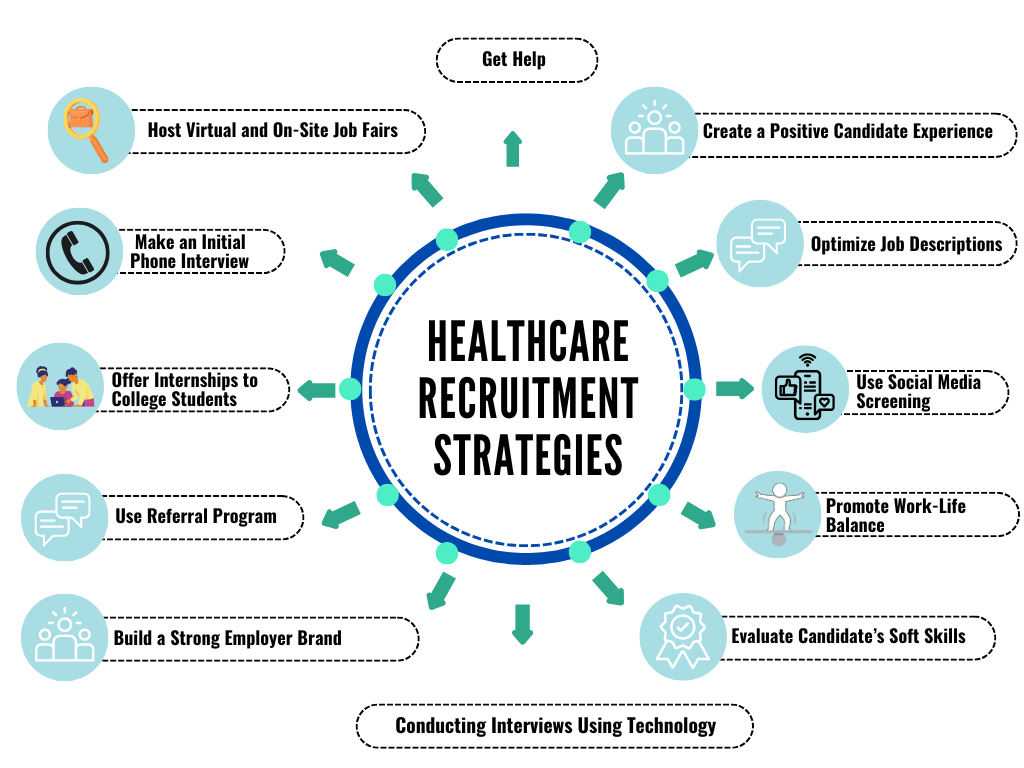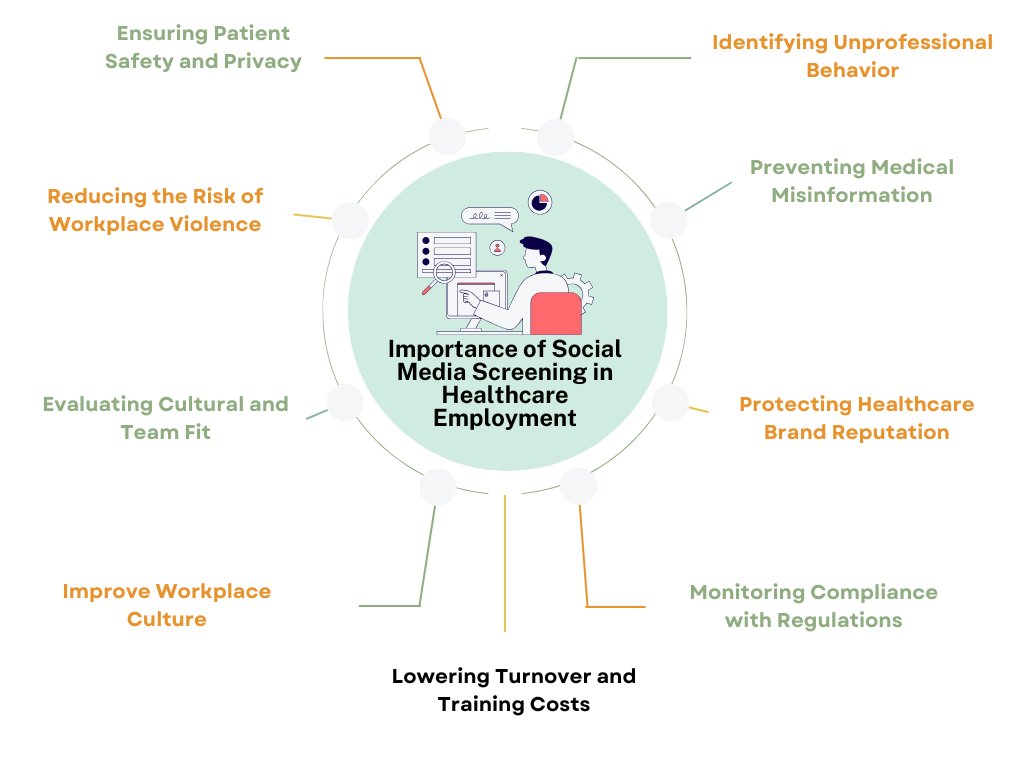Role of Social Media in Healthcare: Recruitment Strategies For Effective Hiring

Hiring in healthcare can feel like an uphill battle. With high turnover rates, a shortage of skilled professionals, and constant competition for top talent, healthcare recruiters and HR teams face more pressure than ever.
The challenge doesn't end with finding candidates; you need to attract the right individuals who can handle the demands of healthcare while aligning with your organization's values.
Whether you're struggling to fill specialized healthcare roles or aiming to reduce hiring bias, these strategies will guide you in attracting qualified, compassionate, and dedicated candidates who are prepared for the dynamic healthcare environment.
Why are Healthcare Recruitment Strategies Important?
Effective recruitment strategies help healthcare organizations overcome common industry challenges, such as high turnover rates, talent shortages, and the need for specialized skills.
The Bureau of Labor Statistics projects the healthcare and social assistance sector will add about 2.1 million jobs by 2032. This demand emphasizes the need for healthcare facilities to adopt effective recruitment strategies to ensure they have the staff required to deliver high-quality patient care. Additionally, social media plays a significant role among healthcare professionals (HCPs), with various healthcare institutions establishing guidelines to navigate its benefits and pitfalls.
By using well-designed approaches, healthcare recruiters can attract candidates who not only possess the necessary qualifications but also align with the organization’s mission and values. This alignment is crucial in healthcare, where compassionate care and patient safety are top priorities.
14 Healthcare Recruitment Strategies

1. Create a Positive Candidate Experience
Studies show that four out of five candidates read company ratings and reviews before applying. Providing a positive candidate experience is crucial in attracting top talent, especially in the highly competitive healthcare industry. A smooth, respectful, and transparent recruitment process encourages potential hires to have a favorable view of the organization.
Key elements include clear communication, timely feedback, and a seamless application process. Candidates who feel valued during recruitment are more likely to accept job offers and recommend the organization to others. Additionally, healthcare organizations that maintain a positive candidate experience often find that applicants are more engaged in the hiring process, leading to better-fit hires and a stronger organizational reputation.
2. Optimize Job Descriptions and Attract Strong Candidates
Clear job descriptions are the first impression candidates have of your healthcare organization, so they should be clear, concise, and targeted to attract the right talent. Highlighting specific skills, required certifications, and job responsibilities, as well as emphasizing the unique aspects of your organization (such as growth opportunities, work environment, and culture), can help attract candidates who are a good fit.
Avoid using jargon or overly complex language; focus on outlining key competencies and how they relate to patient care. By being transparent about expectations and benefits, you will increase the likelihood of attracting candidates who are genuinely interested in the role.
Job descriptions help attract qualified candidates who can effectively fulfill the role requirements. Focus on key skills, responsibilities, and benefits, avoiding jargon to make the descriptions more accessible.
3. Utilize Social Media Screening in Recruitment
Social media screening is a valuable tool for healthcare organizations to assess potential candidates during the recruitment process. By reviewing a candidate’s social media presence, healthcare providers can gain insight into their personality, values, and behavior. This can help identify potential red flags, such as unprofessional behavior or breaches of patient confidentiality. Healthcare organizations can also use social media screening to verify a candidate’s credentials and experience.
When conducting social media screening, healthcare providers should ensure that they are complying with relevant laws and regulations, such as the Health Insurance Portability and Accountability Act (HIPAA). It is also important to establish clear guidelines and protocols for social media screening to ensure consistency and fairness.
Some popular social media platforms for recruitment include LinkedIn, Twitter, and Facebook. Healthcare organizations can use these platforms to post job openings, engage with potential candidates, and build their employer brand.
3. Utilize Social Media Screening in Recruitment
can provide a deeper understanding of a candidate’s character, behavior, and compatibility with your organization’s values. This screening helps to assess red flags (such as inappropriate behavior, discriminatory posts, or professionalism issues) that may not be evident in traditional resumes or interviews.
Social media can highlight a candidate’s engagement with professional communities or industry-related content, which can be a sign of passion and commitment to the healthcare field. However, it is essential to use this tool responsibly and consistently to avoid bias or privacy violations.
Healthcare professionals must also create responsible social media posts to protect patient privacy and comply with regulations like HIPAA.
Learn More about How Social Media Screening and Background check Influence Healthcare Recruitment
4. Evaluate Candidate's Soft Skills
While technical expertise is vital in healthcare, soft skills like communication, empathy, and teamwork are just as important. Healthcare workers often interact with patients, families, and other professionals, and these interpersonal skills can significantly impact the quality of patient care and the work environment.
During interviews, focus on assessing these qualities through situational or behavioral questions that allow candidates to demonstrate how they handle challenges, communicate with patients, and collaborate with their peers. Soft skills assessments, including role-playing exercises or team-based problem-solving scenarios, can also provide valuable insights.
5. Conducting Interviews Using Technology
Using virtual platforms for interviews allows modern recruiters to conduct flexible interviews that save time for both candidates and employers, especially in fast-paced healthcare settings. This method allows organizations to reach a broader talent pool, especially for roles that require specialized skills in remote or underserved areas.
Video interviews also streamline scheduling, reduce time spent on travel, and create a more convenient process for both parties. However, it's essential to ensure that virtual interviews are conducted professionally, with appropriate technology, good lighting, and a stable internet connection. Virtual assessments, such as online tests or simulations, can also be incorporated into the process for additional evaluation.
6. Build a Strong Employer Brand and Organization's Culture
A well-established employer brand plays a critical role in attracting top talent, especially in healthcare, where candidates seek employers that align with their values. Emphasize aspects of your organization’s culture that resonate with healthcare professionals, such as your commitment to patient care, employee well-being, professional development opportunities, and community engagement.
Healthcare social media can serve as a cost-effective marketing tool to enhance the employer brand and connect with potential candidates.
Showcase testimonials from current staff, provide insights into your leadership style and highlight your organization’s values in marketing materials and on your website. A strong employer brand not only attracts candidates but also helps retain current employees by creating a sense of pride and loyalty to the organization.
7. Use Referral Program for Employees
Employee referral programs can significantly enhance recruitment efforts by tapping into your current workforce's network of qualified professionals. Healthcare workers often know others in their field who would be a good fit for your organization.
By incentivizing referrals (through bonuses, recognition, or other rewards), you create a more engaged workforce that actively contributes to talent acquisition. Referrals tend to bring in candidates who are culturally aligned with your organization and who are more likely to stay long-term, reducing turnover rates and recruitment costs.
8. Offer Internships to College Students
Internship programs serve as a talent pipeline for healthcare organizations while giving students hands-on experience in a real-world healthcare setting. Interns gain valuable insights into the demands of healthcare work, while organizations have the opportunity to evaluate candidates' skills, work ethic, and potential for future roles.
Internships can be structured to provide students with exposure to various areas within healthcare, from clinical care to administration, helping both the intern and the organization determine if a long-term position is a good fit. Additionally, internship programs demonstrate the organization's commitment to mentoring and developing the next generation of healthcare professionals.
9. Make an Initial Phone Interview to Reduce Hiring Bias
An initial phone interview can help reduce hiring bias that may occur during in-person interactions, allowing hiring managers to focus purely on a candidate's qualifications, experience, and communication skills. Phone interviews also give candidates a chance to speak freely without the pressure of in-person judgment, promoting a more level playing field.
This method can reduce bias based on appearance, gender, age, or ethnicity, ensuring that hiring decisions are based on a candidate's skills and potential rather than unconscious prejudices. It is a valuable tool in creating a fairer, more inclusive recruitment process.
10. Host Virtual and On-Site Job Fairs
Job fairs, both virtual and on-site, are effective platforms for reaching a large pool of healthcare candidates in a short amount of time. Virtual job fairs allow employers to connect with a diverse range of candidates from various geographical locations, while on-site events offer face-to-face interaction, which can build rapport and trust.
These events also provide an opportunity for candidates to learn more about your organization, meet potential colleagues, and understand the unique benefits of working for your healthcare facility. Hosting job fairs regularly keeps your organization visible and attractive to healthcare professionals seeking new opportunities.
11. Get Help for Recruiting for Better Results
Partnering with specialized recruitment agencies or utilizing digital hiring platforms can significantly streamline the healthcare recruitment process. These partners bring expertise in sourcing candidates, handling initial screenings, and reducing time-to-hire, which is especially crucial in industries experiencing talent shortages.
Recruitment agencies can help fill urgent vacancies, ensure high-quality candidate matches, and assist in areas where your team may lack specialized recruitment knowledge. Digital platforms and applicant tracking systems (ATS) can automate many aspects of the hiring process, providing faster and more efficient recruitment, reducing administrative workload, and improving the overall candidate experience.
Discover How Ferretly Enhances Recruitment Efficiency for Healthcare Organizations and request a demo now!
12. Networking and Partnerships
Social media can be a powerful tool for healthcare organizations to build partnerships and networks. By engaging with other healthcare providers, organizations, and stakeholders on social media, healthcare providers can build relationships, share knowledge, and collaborate on projects.
Healthcare organizations can use social media to connect with other healthcare providers, researchers, and industry experts. This can help facilitate collaboration, knowledge-sharing, and innovation. Social media can also be used to build partnerships with patient advocacy groups, community organizations, and other stakeholders.
Some popular social media platforms for networking and partnerships include LinkedIn, Twitter, and Facebook. Healthcare organizations can use these platforms to join relevant groups, engage in online discussions, and build relationships with other healthcare providers and stakeholders.
13. Utilizing Data and Analytics
Social media data and analytics can provide valuable insights for healthcare organizations. By analyzing social media data, healthcare providers can gain a better understanding of their online presence, engagement, and reputation. This can help inform marketing strategies, improve patient engagement, and enhance the overall patient experience.
Healthcare organizations can use social media analytics tools to track engagement metrics, such as likes, shares, and comments. They can also use analytics tools to monitor their online reputation, track patient sentiment, and identify trends and patterns in social media data.
14. Retention and Onboarding
Social media can be a valuable tool for healthcare organizations to support retention and onboarding efforts. Healthcare providers can build relationships, provide support, and promote a positive work environment by engaging with new hires on social media.
Healthcare organizations can use social media to support retention and onboarding by creating a private online community for new hires. This can provide a safe space for new hires to ask questions, share concerns, and connect with colleagues.
Challenges in Healthcare Recruiting
Recruiting qualified healthcare professionals is a complex task due to several factors that impact both the demand for workers and the strategies required to attract the right candidates. The U.S. Department of Health and Human Services (HHS) plays a crucial role in enforcing the HIPAA Privacy Rule, which sets the standard for safeguarding patient confidentiality and defines the obligations of healthcare providers regarding the use and disclosure of personal health information. This regulation significantly impacts healthcare recruiting by adding layers of compliance and privacy considerations.

Below are the key challenges faced by healthcare organizations when recruiting talent:
1. Talent and Skills Shortage
Recruiting in healthcare is challenging due to the shortage of qualified professionals. Studies show that 1/3 of U.S. citizens have lied on their resumes about their work experience, skills, educational background, or how long they worked at their last organizations. Ensuring a rigorous screening process helps verify skills and qualifications.
2. High Turnover Rates
High turnover can lead to staffing shortages that disrupt patient care. Addressing turnover through supportive management and a strong workplace culture can improve staff retention.
3. Lengthy Hiring Process
Long recruitment processes may lead healthcare organizations to lose qualified candidates to employers with faster response times. Improving hiring stages is essential to attract and secure top talent efficiently.
4. Burnout and Job Satisfaction
The need for healthcare roles frequently contributes to staff burnout, impacting both job satisfaction and retention rates. Organizations can address this by promoting work-life balance and providing mental health resources, which help create a more supportive environment for healthcare professionals.
5. Market Demand for Specialized Roles
Specific healthcare positions in specialized fields are experiencing high demand. To attract these candidates, organizations must provide competitive salaries and opportunities for training and professional growth.
6. Challenges in Rural and Underserved Areas
Healthcare facilities in rural regions often face difficulties in attracting qualified professionals. Providing relocation assistance and other incentives can enhance the appeal of these positions to potential candidates.
7. Compliance Requirements and Budget Constraints
Hiring in the healthcare sector necessitates exact compliance to compliance standards, which can elevate costs and prolong the recruitment process. Implementing effective recruitment strategies can help manage these expenses efficiently.
Importance of Social Media Screening in Healthcare Employment

Managing social media accounts in the healthcare sector is challenging and important. It requires consistent content creation and significant time investment, but it can enhance branding and recruitment through employee advocacy.
- Identifying Unprofessional Behavior: Screening helps uncover any unprofessional actions that could damage the reputation of an organization.
- Preventing Medical Misinformation: Reviewing online presence of candidates aids in identifying those who may spread inaccurate medical information.
- Protecting Healthcare Brand Reputation: Effective screening can help protect brand image from potential damage caused by inappropriate online conduct.
- Monitoring Compliance with Regulations: Social media screening makes it easier to verify that candidates endanger industry standards.
- Ensuring Patient Safety and Privacy: By screening applicants, organizations can spot individuals who might endanger patient safety.
- Reducing the Risk of Workplace Violence or Harassment: Screening helps reduce workplace violence by identifying behaviors in social media profiles of candidates.
- Evaluating Cultural and Team Fit: Insights from social media can aid in evaluating cultural fit of candidates and their integration into the team.
- Improve Workplace Culture: using allows organizations to improve workplace culture by ensuring new hires share the value of organization.
- Lowering Turnover and Training Costs: By knowing candidates more likely to remain long-term, screening reduces turnover and training expenses.
Learn More About the Importance of Social Media Screening in Healthcare Hiring
How Ferretly Will Help in Healthcare Employment?
Ferretly's AI-powered platform helps healthcare organizations implement effective social media screenings and background checks.
By identifying potential risks in online behavior, Ferretly enables organizations to make well-informed hiring decisions that protect patients and employees.
The platform's user-friendly interface provides faster, more accurate assessments, enabling healthcare recruiters to reduce liability while maintaining high standards of safety and professionalism.
Frequently Asked Questions
1. How do you recruit in the healthcare industry?
For effective recruitment in the healthcare sector, use these key strategies:
- Clear Job Descriptions: Use detailed job descriptions that outline responsibilities and qualifications.
- Strong Employer Branding: Build a strong employer brand that showcases the mission and values of the organization.
- Use Strategic Tools: Use tools to evaluate the online presence of candidates.
- Incorporate Technology: Use Applicant Tracking Systems (ATS) to improve the hiring process, making it easier to communicate with candidates.
2. Is healthcare recruiting hard?
Yes, recruiting in healthcare can be challenging due to several factors. There is often a shortage of skilled professionals, especially in specialties like nursing and surgery. High turnover rates require a focus on retention strategies, while strict regulatory requirements complicate hiring with the need for background checks.
Many roles also require specific certifications, which reduces the candidate pool. To improve outcomes, organizations should enhance their hiring processes and communication while offering flexibility in scheduling to create a more attractive work environment.
3. How can healthcare organizations attract top talent?
Healthcare organizations can attract top talent by creating a positive recruitment experience for candidates. This includes maintaining clear communication, providing prompt feedback, and ensuring that interviews are engaging and informative.
Offering competitive benefits—such as comprehensive health coverage, retirement options, and flexible work schedules—can improve an organization’s attractiveness. Furthermore, cultivating a supportive work environment that promotes continuous professional development through training opportunities and mentorship can entice individuals who seek career advancement and personal growth.
Additionally, healthcare organizations can share valuable health advice through social media to improve patient education and engagement. This helps address specific geographic health concerns and fosters a supportive and informative community for patients.
4. Why is social media screening important in healthcare recruitment?
Social media screening is important in healthcare recruitment as it helps organizations identify potential risks linked to candidates' online activities. By examining candidates' social media profiles, employers can assess their professionalism, character, and suitability for the organization.
This process is essential for ensuring patient safety by filtering out individuals who may not align with the organization's values or who could pose a risk.
It plays a key role in protecting the healthcare brand's reputation and fostering a positive workplace culture by ensuring that new hires contribute constructively to the overall environment.
5. How can employee referrals enhance recruitment efforts?
Employee referrals bring in candidates who align with the organization's values and culture, making it a valuable recruitment tool that promotes a better workplace fit and reduces hiring times.
6. What role do job fairs play in healthcare recruitment?
Job fairs offer a platform for healthcare organizations to connect directly with job seekers, giving both parties insights into opportunities and organizational culture in a short period.






